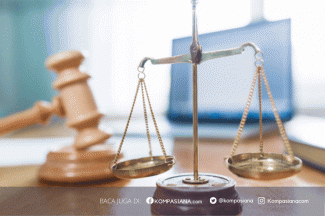Bantahan Kuasa Hukum terhadap Tuduhan Ijazah Palsu Jokowi
The legal representatives of President Joko Widodo have mounted a staunch defense against allegations concerning the authenticity of his academic credentials, dismissing them as unfounded and defamatory. This categorical denial underscores the gravity with which the accusations are being treated, given their potential to undermine the legitimacy of the President's position and the integrity of the electoral process. Such accusations, particularly those questioning the validity of educational qualifications, strike at the heart of public trust and can have far-reaching implications for political stability and governance (Akbar, 2021). The legal team's firm stance indicates a determination to protect the President's reputation and to safeguard the sanctity of the office he holds. The controversy surrounding the alleged falsification of documents is not a novel phenomenon, particularly within the context of Indonesian politics and legal proceedings (Chaniago et al., 2021; Syarifudin, 2021). Instances of such claims have surfaced in the past, often fueled by political rivalries and a desire to delegitimize opponents (Fatmawati, 2020).
The specific allegations leveled against President Widodo, pertaining to the legitimacy of his academic credentials, necessitate a thorough examination of the evidence presented and a careful consideration of the legal framework governing the recognition and verification of educational qualifications. . The legal team's vigorous defense suggests that they possess compelling evidence to counter these claims and are prepared to present it in the appropriate legal forums. The implications of these accusations extend beyond the realm of personal reputation and touch upon fundamental principles of governance and the rule of law (Akbar, 2020). The legal challenge can potentially destabilize the government, incite public distrust and create opportunities for political opponents to exploit the situation.
The legal ramifications of such accusations are significant, potentially leading to formal investigations, judicial reviews, and even impeachment proceedings if the allegations are substantiated. In Indonesia, the process for potentially dismissing a President or Vice President is initiated by the House of Representatives submitting a proposal to the People's Consultative Assembly, given that the President and/or Vice President has violated the provisions in Articles 7A and 7B, and this must be proven first by the Constitutional Court through examination and proof (Isnawati et al., 2023). The defense strategy employed by President Widodo's legal team is likely to involve a multi-pronged approach, including presenting evidence of his academic achievements, challenging the credibility of the accusers, and highlighting the political motivations behind the allegations (Akbar, 2020). The dispute also contained the considerations of the panel of judges, which stated that the birth certificate that was included in the authentic deed had perfect evidence so that it could deny the Plaintiffs' claim, which only had evidence in the form of written evidence made unilaterally (Sari et al., 2022).
Given the intense public scrutiny and the potential for political manipulation, it is imperative that the legal process is conducted with utmost transparency and impartiality, ensuring that all parties have a fair opportunity to present their case. The independence of the judiciary is vital, ensuring its position must be maintained in Indonesia because any attempt to intervene in the authority of the Supreme Court and the Constitutional Court in the justice system, including intervention from the President, must be considered an unconstitutional act and violates the ideals of the Indonesian rule of law (Ridlwan & Firmansyah, 2020). The resolution of this matter will have far-reaching consequences for Indonesian politics and will serve as a test of the country's commitment to the rule of law and democratic principles. The dynamics between the President and the legislative body, particularly the DPR, also play a crucial role in maintaining political stability during such controversies (Sugiharto, 2020). Furthermore, the rise of social media and online platforms has amplified the spread of information, both accurate and misleading, making it even more challenging to manage public perception and ensure informed discourse.
The Constitutional Court of Indonesia holds a pivotal position in safeguarding the nation's democracy, a role that becomes particularly salient during periods of political contestation and legal challenges to the legitimacy of elected officials (Siregar, 2015). As the guardian of the constitution, the Court is entrusted with the responsibility of ensuring that all legal processes adhere to the principles of fairness, transparency, and due process (Abustan et al., 2020). The court is responsible for judicial activism, giving decisions that emphasize substantive justice so that it can revive the values of benefit and justice in society (Prabowo, 2022). The Court's decisions carry significant weight, shaping the political landscape and influencing public trust in the integrity of the government. The Court's impartiality is paramount, requiring it to act independently of political pressures and to base its judgments solely on the evidence presented and the provisions of the constitution. The integrity and competence of the judges presiding over such cases are of utmost importance, as their decisions will have a profound impact on the future of Indonesian democracy (Yusuf et al., 2017).
References
Abustan, A., Siregar, H. A., & Mustomi, O. (2020). Constitutional Court as the Guard of Enforcement Constitution: Is It Challenging? https://doi.org/10.2991/aebmr.k.200226.032
Akbar, M. A. (2020). Politik Hukum Pemberhentian (Pemakzulan) Presiden dan/atau Wakil Presiden di Indonesia dalam Prespektif Negara Hukum dan Demokrasi. SASI, 26(3), 325. https://doi.org/10.47268/sasi.v26i3.276
Akbar, M. I. (2021). Political Will terhadap Kelembagaan KPK Era Presiden Jokowi. Syntax Idea, 3(6), 1389. https://doi.org/10.36418/syntax-idea.v3i6.1273
Chaniago, N., Sukarno, P., & Wardana, A. A. (2021). Electronic document authenticity verification of diploma and transcript using smart contract on Ethereum blockchain. Register Jurnal Ilmiah Teknologi Sistem Informasi, 7(2), 149. https://doi.org/10.26594/register.v7i2.1959
